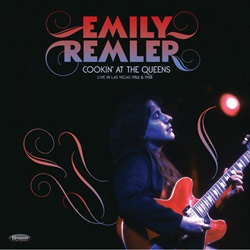Emily Remler - Cookin’ at the Queens: Live in Las Vegas (1984 & 1988)
(Resonance Records, 2024)
Emily Remler is not a household name. It should be, but Remler was a jazz guitarist, a role typically predominated by men. She was a statistical outlier. Even within a denigrated art form like jazz, she was still the object of discrimination: because she was a woman, because she was a musician with exceptional chops, because she had the de rigueur nagging opiate addiction that would never quite go away, giving her a second act. Remler was, as she described, “I may look like a nice Jewish girl from New Jersey, but inside I’m a 50-year-old, heavyset black man with a big thumb, like Wes Montgomery.”
Much jazz writing makes a questionable point of Remler’s affinity for Montgomery, almost to where she had nothing of her own, stylistically. Throw in Pat Martino, and Remler could have no identity at all. There are several considerations here. Any musician has to start somewhere and ever since Robert Johnson heard Son House’s “Preachin’ Blues,” learning it, note-for-note, from the Paramount 78 and made it his own. Remler did nothing different, except she had the benefit of conservatoire training and a wild spirit of creative adventure. The music she made on her few studio albums was revelatory: on Concord Records alone, she released Firefly (1981), Take Two (1982), Transitions (1983), Catwalk (1985), Together (with Larry Coryell) (1985), perhaps her masterpiece, East to Wes (1988), and, finally, This Is Me (Justice, 1990).
Remler was to die, May 4, 1990, in Sidney, Australia, while on tour, from a “heart attack” (the same heart attack that killed Jim Morrison on July 3, 1971, perfectly imagined in “The Death of Marat” by Jacques-Louis David (1793), Lowell George on June 29, 1979 in the Twin Bridges Marriott in Alexandria, VA, while appearing at Washington, D.C.'s Lisner Auditorium, and comedian John Belushi on March 5, 1982 in a bungalow at Chateau Marmont in Los Angeles (his “heart attack” administered to him by Gordon Lightfoot’s (“Sundown”) girlfriend Cathy Smith). This clouds all the reportage of Remler since her death. Let’s weave our way out of this with Cookin’ At Queens." What an anemic euphemism.
The Four Queens Resort & Casino still exists on the old Vegas Strip. In the 1980s and ‘90s, the casino was host to a jazz program that has produced Shirley Horn Live At The 4 Queens (Resonance, 2020) and, hopefully, promises many more. This was a perfect venue for Remler: small (not not too much), intimate, and with an appreciative audience. The present Remler performances come from Remler’s May 28, 1984 and May 19, 1988 performances, both with different piano trios. Her repertoire contains the familiar bebop: “Autumn Leaves,” “Hot House,” and “What Is This Thing Called Love.” It also contains the best of hard bop: the perfect mashup, “So What / Impressions” and the required Wes Montgomery: “West Coast Blues” and “D-Natural Blues.”
Where Remler breaks away from her inspirations is with the care she employs from those master’s bag or tricks. Recall Remler’s performance of “Softly, As In A Morning Sunrise” on East to Wes. Remler incorporates harmonics with Montgomery octaves in the head presentation. She does this with an obsessive precision that defies the free-flowing ideal of hard bop and post bop. These great live recordings showcase Remler's formidable talent, reminding us of the loss we suffered with her passing, especially with recordings like this. The beauty of a small catalog is the ease with which other musicians may dip their toe in it, discovering what lesser musicians have been missing.



